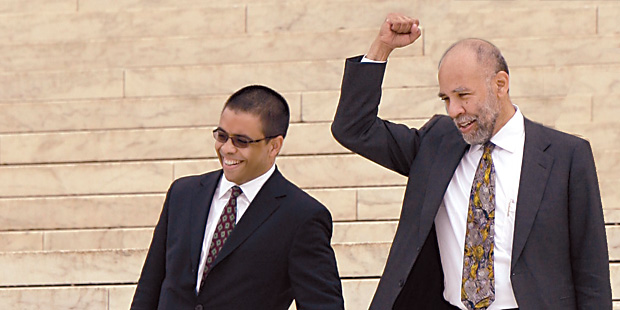Voting Rights Endure—for Now
Printer Friendly VersionWhen Debo Adegbile ’94 (above left) appeared before the Supreme Court in April to argue against a constitutional challenge to Section 5 of the Voting Rights Act of 1965, it was the climax of several years’ effort to win congressional reauthorization of provisions of the VRA. Adegbile, director of litigation at the NAACP Legal Defense and Educational Fund, had testified in both the House and Senate and made appearances across the country to educate the public and engage in debate about VRA issues.
On the surface, the case was a simple one. A small Texas utility district with an elected board wanted the opportunity to “bail out” of its obligations under Section 5, which requires that certain local jurisdictions with a history of voting rights discrimination seek Justice Department preapproval before changing their voting procedures. Since the district does not register voters, it was deemed ineligible to bail out, and so brought suit to win that right or, alternatively, to overturn Section 5 entirely. The latter possibility made Northwest Austin Municipal Utility District Number One v. Holder the most highly anticipated opinion of the last term.
The tone of the oral argument on April 29 led most observers to believe the Supreme Court might declare Section 5 unconstitutional. Adegbile faced skeptical questioning from several justices; one of the most prominently raised questions was whether the mix of covered jurisdictions was now outdated. Many legal analysts predicted a 5-4 decision.
The Court surprised both sides on June 22 when it ruled 8-1 to address the case narrowly, leaving Section 5 intact. The Court gave non–voter-registering entities the right to seek bailout relief, but also implied that Section 5’s constitutional status might be under threat.
Professor Richard Pildes, whose congressional testimony on Section 5’s 2006 reauthorization was quoted in the opinion, said, “Congress had thrown down a gauntlet to the Court by not updating the Act in 2006, and the Court responded in its own more gentle way by essentially throwing the gauntlet back down to Congress and saying the Act is in serious constitutional jeopardy.”
Agreeing with Pildes, Professor Samuel Issacharoff, whose law review article on Section 5 was cited in the ruling, said, “If we look at where the problems have taken place in recent elections, Ohio and Florida come to the fore, and neither one is a covered jurisdiction under Section 5.” Adegbile, on the other hand, considers the continued relevance of Section 5 a legislative matter rather than a judicial one: “Where you have a statute that has withstood the test of time and has been a transformative piece of legislation…that system should not lightly be set aside.”
Acknowledging that no system is flawless, Adegbile said, “Section 5 has never been a perfect metric of all of the places where discrimination is happening, but it’s been a very effective one at getting at some of the most entrenched discrimination.” He added, “In my work I travel near and far to hear from those folks about whether or not they need Section 5…. Their experience has been such that they understand that the struggle for equality is not done yet.”
–
All of 2009 Notes and Renderings


 Multimedia
Multimedia